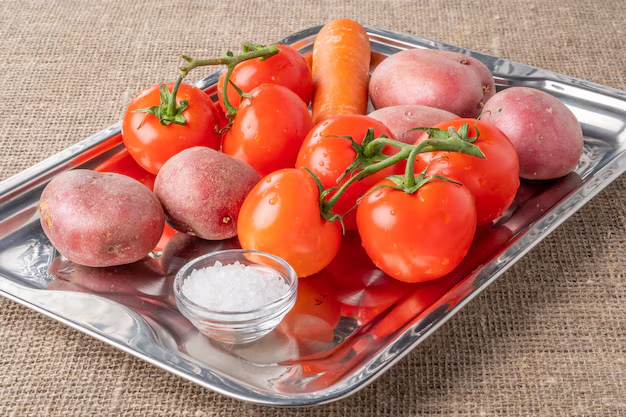Should You Store Onions in the Refrigerator? A Comprehensive Guide to Keeping Your Onions Fresh
When it comes to storing food, onions often puzzle many. Unlike more straightforward foods that clearly belong in the fridge, the onion's placement seems more complex. If you've ever wondered whether onions should dwell in your refrigerator, you're not alone. Let's dive deep into the nuances of onion storage, explore why it matters, and discuss the best practices for maximizing their shelf life.
🧅 The Nature of Onions
Before addressing where to store onions, it's essential to understand their composition. Onions are a staple in culinary practices worldwide, loved for their aroma, flavor, and versatility. They contain a lot of water and sugars, which makes their storage requirements unique compared to, say, dried foods or canned goods.
Why Onion Storage Matters
Proper storage can significantly impact the onion's freshness, texture, and flavor. An improperly stored onion can become soft, moldy, or even sprout before you have the chance to use it. Thus, understanding the science behind onion storage can save both your ingredients and your recipes.
🌡️ Refrigeration: Yay or Nay?
A common debate in household kitchens is whether onions belong in the refrigerator. The answer isn't entirely black and white but depends on several factors such as storage duration, onion type, and environmental conditions.
When to Refrigerate Onions
Prepped Onions: Once you've cut, sliced, or peeled an onion, refrigerating is the best option. Use an airtight container to preserve moisture and prevent the vegetable from absorbing other odors from the fridge.
Warmer Climates: In regions with consistently high temperatures and humidity, storing onions in the fridge might be beneficial to prevent spoilage.
Sweet Onions: Due to their higher water content, sweet onions spoil faster than other types. Refrigeration helps slow down spoilage.
When to Avoid Refrigeration
Whole, Unpeeled Onions: Generally, these thrive in dry, ventilated environments. Cooler temperatures and high humidity levels in refrigerators can foster mold growth in whole onions.
Short-term Use: If you plan to use the onions within a few days, room temperature storage is perfectly acceptable.
🍽️ Ideal Onion Storage Conditions
The best way to store onions will vary based on their form and your living environment. Here's how to ensure they stay fresh:
Storing Whole Onions
- Cool, Dry Place: Store whole onions in a well-ventilated space, away from direct sunlight. An onion's layers trap moisture, so preventing this is key.
- Mesh Bags or Baskets: These allow airflow, reducing moisture build-up and extending freshness.
- Separate from Potatoes: Onions and potatoes should not be stored together as they emit gases that accelerate each other's spoilage.
Storing Cut Onions
- Use Airtight Containers: Once onions are cut, use containers to avoid moisture loss and aroma transfer. Store cut onions in the vegetable drawer of your refrigerator to control humidity.
🌿 Onions Shelf Life Overview
The life span of onions depends significantly on storage practices. Here's a concise look at how long you can expect them to last:
- Whole Onions: Typically last 2 to 3 months in optimal conditions (cool, dry environment).
- Cut/Sliced Onions: Best used within 7 - 10 days when refrigerated.
- Sweet Onions: Due to higher moisture, these may last up to a month when refrigerated from the start.
🥧 Recognizing Spoilage
It's also crucial to know when onions have gone bad to prevent foodborne illness or unpleasant culinary experiences. Here are signs your onions might be past their prime:
- Soft Spots or Mushiness: Indicates internal decay.
- Sprouting: While not harmful, it suggests the onion's nutrients are converting to new growth. Remove the sprout and use as needed.
- Foul Smell: A rotting onion has an intensively sour or unpleasant odor.
- Mold: Black or white mold patches on the skin imply excessive humidity during storage.
🛠️ Practical Tips for Storing Onions
To make your onion storage method even more effective, here are some practical pointers:
- 👍 Keep in the Dark: Light can encourage the sprouting process, so opt for a dark pantry when possible.
- 📦 Use Paper Bags: If you have an excess of onions, perforated paper bags can help control moisture while ensuring adequate ventilation.
- 🛍️ Avoid Plastic: Plastic bags generally reduce airflow, which may lead to quicker spoilage or rot.
🔍 Related Food Storage Insights
Understanding how to store onions opens the door to exploring other related food storage insights:
Garlic: Like onions, garlic benefits from a cool, dry environment. However, it should not be stored in the fridge.
Potatoes: Potatoes prefer dark, cool spaces too and can become sweet when stored in cold temperatures.
Shallots and Scallions: While scallions can be kept in the fridge, shallots enjoy similar storage conditions to onions.
📊 Onion Storage Summary
Here's a visually distinct summary table to keep your onion storage strategies clear and straightforward:
| Storage Type | Ideal Condition | Shelf Life Tips 🔍 |
|---|---|---|
| Whole Onions | Cool, dry, ventilated | 2 - 3 months 🌟 |
| Sweet Onions | Refrigerated, dark space | Up to 1 month ⭐ |
| Cut/Sliced Onions | Airtight container, fridge | 7 - 10 days 🥗 |
Storing onions properly ensures they remain an essential, flavorful part of your kitchen toolkit. With a better grip on the dos and don'ts of onion storage, enjoy fresher and more effective culinary experiences with every slice and dice. Stay attentive to your kitchen's climate, type of onions, and use timelines, and you’ll keep your onions fresher for longer.

